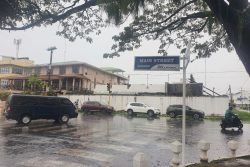Dear Editor,
The topic of data and by extension, data supported by statistics, is of extreme importance to Guyana and I thank Mr. Gampat for his letter (Jul 19). In his letter, Mr. Gampat referenced the World Bank SPI’s and the key areas through which they evaluate a country’s statistical systems. With this letter, I hope for an opportunity to highlight a few points about data, that readers may find interesting or relevant. What’s more, is that I hope for a chance to hold space for a conversation that I think, in itself, represents a foundation stone in our attitude towards our own development as a country.
The way we think and talk about data will say a lot about how we see ourselves, how far we actually go as an economic unit and how far we go as a society. Editor, I want to stress that data is useful to more than just the government itself. Data can provide insight that drives all kinds of decisions made by every kind of decision-maker conceivable, from individuals to households and from corporations to governments. Data drives business and economic growth through the discovery of latent trends and through the prediction of future trends. Editor, there was a sentiment in the comments under Mr. Gampat’s letter, that “data is useless” while its users are “overly technical” and that such technicality is even “something to be wary of”. I contend that it is that sort of viewpoint that is useless, especially in today’s world.
Editor, do permit me to invite a few questions as food for thought. What products or services might be of interest to men in charge of households with five or more members? How much could we expect single women between the ages of 24-32, to spend on entertainment, transportation or self-care and could their place of residence, by region, by township or by neighbourhood, have an impact on said expenditures? Could the next great manufacturing plant, barber shop, restaurant, taxi service, laundromat, cafe, film studio, call centre or agro-processing facility position itself on the map based on key insights about the population, its distribution, its demographics, its transit patterns or environmental conditions surrounding? Could entirely new and novel, businesses be conceived based on said population characteristics? I believe that they most certainly can.
Editor, the readership may find it interesting that questions such as the ones I postulated could be explored using the data set built through the Labour Force Survey, which is conducted by the Bureau of Statistics. The LFS is just one example of a potentially powerful resource that can be mined for all kinds of insights. A society that sees value in encouraging local private investment at all levels, large, small, medium and anywhere else on the continuum, would be remiss not to develop their statistical systems. You see Editor, there is data and then there are those who use data, and I want to point out that there are many of us in Guyana who would put that data to good use, as we build our livelihoods and grow our communities.
Editor, is it that our country “will never” attain to this kind of sensibility? What prompts us in Guyana to think and feel that information cannot be useful? What does leadership contend? Do they see the value of a stronger Guyana through empowered Guyanese, making investments and growing at home? Again, I thank Mr. Gampat for his discussion on the state of our evaluation on the SPI’s. The scores that we have received on that index say a lot about our attitude toward ourselves.
Sincerely,
Emille Giddings






